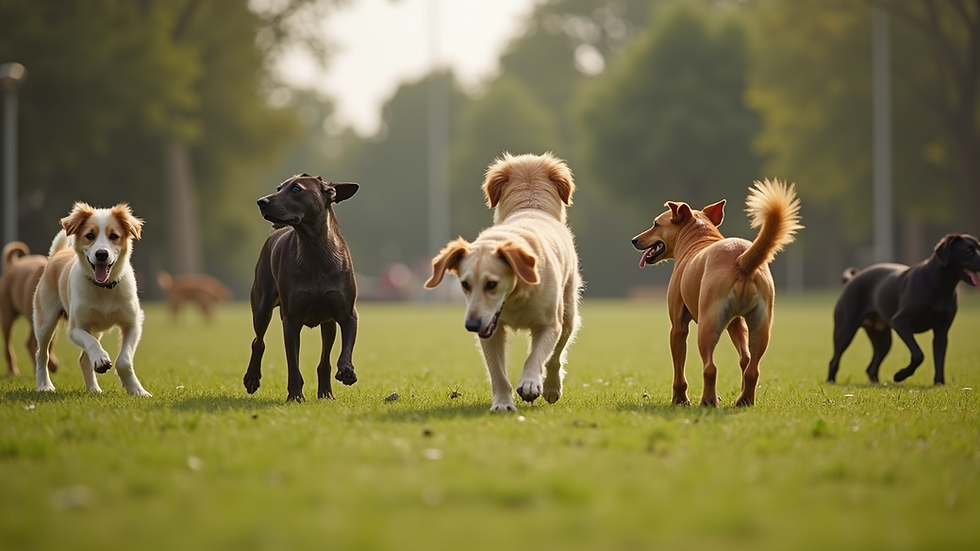Unleashing Fun The Secret Benefits of Canine Play and Socialization
- justine498
- Jun 1, 2025
- 4 min read
When you think about your dog having fun, what comes to mind? Chasing sticks, playing fetch, or perhaps wrestling with their furry friends? These joyful activities are much more than just playful pastimes; they are essential for your dog's well-being. Let's explore the importance of canine play and socialization, highlighting benefits that extend far beyond mere entertainment.
Understanding Canine Play
Play is a crucial aspect of a dog’s life. Canine play, whether it’s with other dogs or humans, provides a range of physical and psychological benefits. Engaging in play helps dogs improve agility, coordination, and overall health.
Play mimics natural behaviours dogs would exhibit in the wild, such as chasing, wrestling, and hunting. For instance, a dog chasing a ball enhances its speed and reflexes, while wrestling with other dogs helps it learn how to gauge strength and intensity. These activities sharpen instincts, allowing dogs to react and adapt better to various environments. Importantly, play fosters a bond between dogs and their human companions, reinforcing trust and affection.
Additionally, during play, dogs communicate using unique signals. They learn essential social cues, such as body language and vocalizations, vital for establishing relationships with both humans and other dogs. Studies show that well-socialized dogs are 50% less likely to show signs of aggression toward other animals.
Benefits of Socialization for Dogs
Socialization is the process of exposing dogs to new experiences, environments, and other animals, crucial for nurturing well-adjusted and confident companions.
Reduces Fear and Anxiety
Exposing dogs to various sights, sounds, and smells helps them become less fearful of the world around them. For example, a study revealed that dogs who experienced different environments during their first six months had a 70% lower chance of developing anxiety-related issues later in life.
Enhances Behavioural Skills
A well-socialized dog learns appropriate behaviour patterns and how to interact calmly with other dogs and humans. Such dogs are generally better at adapting to new situations. A survey indicated that 85% of dog owners whose pets had consistent socialization reported positive interactions in new environments, like busy streets and dog parks.
Encourages Positive Experiences
By thoughtfully introducing dogs to other dogs, people, and different settings through structured play, you help foster positive associations. Dogs with good socialization experiences often have better emotional health, just as humans do. A positive play experience can lead to happier and more balanced dogs, contributing to an overall joyful life.

The Role of Structured Play Sessions
While spontaneous play is great for socialization, structured play sessions are equally vital. These sessions, often organized by professionals who understand canine behaviour, can take many forms, such as agility training, obedience classes, or organized doggy daycare.
Structured play provides several benefits:
Skill Development: Dogs learn vital commands and skills that enhance their behaviour. For example, a dog that participates in regular training classes is reported to follow commands 50% more reliably than those that do not.
Safe Environment: These professional settings are designed to ensure safe and healthy interactions, minimizing the risk of negative experiences during play. Owners reported a 40% increase in their dogs' confidence after regular attendance at supervised play sessions.
Adaptability: Structured play exposes dogs to various stimuli in a controlled manner, helping them become more adaptable and resilient.
Finding the Right Playmate
Not every dog is suited to play with every other dog. Dogs, much like humans, have unique personalities and play styles. Here are key factors to consider when choosing playmates:
Size and Energy Level: Larger dogs can unintentionally dominate smaller ones, creating awkward or even dangerous situations. For instance, matching sizes and energy levels lead to satisfying playtime for all dogs involved. A well-matched playgroup can increase engagement and reduce negative interactions by 30%.
Temperament: Some dogs are inherently more assertive than others. Observing how your dog interacts with potential playmates provides insight into whether an introduction would be successful. A dominant dog may not play well with one that is more passive.
Behavioral Cues: Pay attention to how dogs communicate during play. If one dog seems uninterested or overwhelmed, it’s crucial to intervene and adjust the situation accordingly.
Long-Term Benefits of Canine Play and Socialization
The advantages of engaging your dog in play and socialization extend well beyond their puppy years. These activities positively influence a dog’s behaviour throughout its life.
Preventing Aggression: Regular socialization minimizes the risk of aggressive tendencies. Dogs that learn appropriate social behaviour are 60% less likely to exhibit aggression behaviours later in life.
Health Maintenance: Play is essential for physical health. Regular activity can prevent obesity, promote healthy joint function, and strengthen the cardiovascular system. Studies show that active dogs live, on average, 1.5 years longer than their sedentary counterparts.
Mental Stimulation: Engaging with others and experiencing new environments keeps a dog's mind sharp. Like humans, dogs thrive on mental stimulation. A well-stimulated dog will likely show a 25% increase in learning ability and retention.

The Joy of Canine Connection
Canine play and socialization are essential for the overall well-being of our furry friends. The significance of these activities cannot be overstated—they promote physical fitness, enhance social skills, reduce anxiety, and contribute to a long, healthy life. Investing time in regular play and socialization means investing in your dog’s happiness and health.
So, unleash the fun for your canine companion by incorporating play and socialization into their daily routine. Whether through playdates, training classes, or outings to local dog parks, every opportunity you provide contributes to a more balanced and joyful life for your dog.





Comments